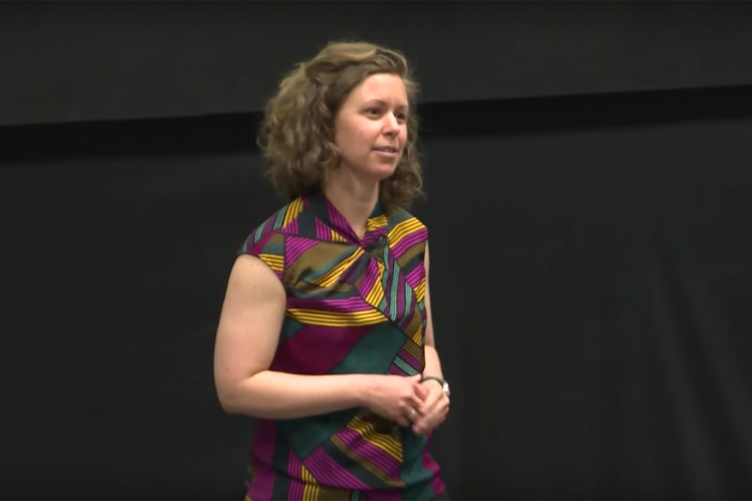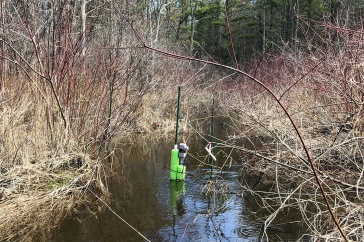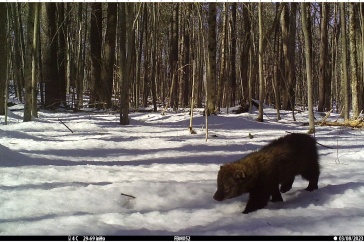
Lesley Atwood, a doctoral candidate in agroecology, was the grand prize winner and people’s choice winner in UNH’s first 3 Minute Thesis (3MT) competition.
One of the most challenging aspects for any scientist is successfully explaining to lay audiences with little or no scientific background the details and importance of complex research. Recently, two graduate students with the UNH College of Life Sciences and Agriculture excelled at just that, and in under three minutes.
Lesley Atwood, a doctoral candidate in agroecology, was the grand prize winner and people’s choice winner in UNH’s first 3 Minute Thesis (3MT) competition. Devon O’Rourke, a graduate student in molecular biology, was a finalist.
Sponsored by the UNH Graduate School, the 3 Minute Thesis pilot program at UNH was introduced in 2016 with 18 doctoral students participating. The full program will launch during the UNH’s sesquicentennial celebration in 2017. UNH’s 3 Minute Thesis event is part of an international academic competition that challenges students to describe their research within three minutes to a general audience. 3MT celebrates the discoveries made by research students and encourages their skill in communicating the importance of research to the broader community, and participants are judged on comprehensive, content, engagement, and communication.
Interim UNH Graduate School Dean Dr. Cari Moorhead explained that by design, the 3MT forces graduate students to consolidate their ideas and concisely explain their research, its context, and findings, to a broad audience. “We know that the strong communication skills required to participate in the 3MT are essential for today’s graduates,” Moorhead said. “We are so proud to offer the 3MT as part of our Professional Development portfolio.”

Atwood studies the interface between agriculture, soil ecology, and community ecology. She explains that “as conventionally managed annual row crop systems rely more heavily on synthetic fertilizers, pesticides, crop monocultures, and tillage to produce consistent cash crop yields, it is increasingly important for us to understand the subsequent impacts these practices have on soil biota and their ability to perform important agroecosystem services. Cumulatively, these data will allow us to develop more effective agricultural management systems in which both provisioning and regulating services are maintained.”
The 3MT competition provided Atwood with an opportunity to present her research to a diverse audience on campus as well as improve her public speaking, which she admits is not her forte. “I usually present my findings at national conferences and to the NREN department, but rarely have an opportunity to speak in front of the entire UNH community. When the opportunity to reach a broader audience presented itself, I signed up,” said Atwood, whose advisor is Dr. Richard Smith, associate professor of agroecology.
“There is an art to communicating very technical research to broad audiences. The most challenging part of the 3MT competition was undoubtedly figuring out how best to communicate the technical aspects of research to people outside of my field. In preparation, I presented my talk to three different audiences -- the UNH Agroecology Lab, nonacademic friends, and UNH’s NREN Department. I took the comments each audience gave into consideration which, I think, tremendously improved my presentation. In the end, I feel like the talk provided enough details for the audience to know what I did and why they should care about the use of pesticide seed treatments,” Atwood said.
O’Rourke, a former high school teacher, agrees. “The 3MT is a competition in storytelling, not in research. You have three minutes to complete the essential elements of any story arc: introducing the major players, building conflict, and then addressing some resolution. From a science angle, that story could get shaped in its traditional introduction, methods, results, discussion form, but that format tends to lose the story-feel that makes these quick talks more attractive. It took me a lot of time to revise those science elements into a more story form,” said O’Rourke, who studies the ecological and evolutionary dynamics of bats with Dr. Jeff Foster, assistant professor of molecular, cellular, and biomedical sciences.
Both Atwood and O’Rourke credit their advisors for their guidance and mentoring not only in preparation for the 3MT competition but throughout their graduate studies. With Smith’s assistance, Atwood has received nearly $90,000 in external research funding from the USDA (Pre-Doctoral Fellowship and Graduate Student Grant) and Annie’s Sustainable Agriculture. O’Rourke has received financial support from the NH Agricultural Experiment Station in the UNH College of Life Sciences and Agriculture.
Following graduation, O’Rourke plans to take time off to spend with his family and then pursue a teaching and research position at an independent high school. Atwood plans to pursue postdoctoral study and then work at a research intensive institution or government agency in a research-teaching/outreach position.
“Through collaborations with farmers, scientists and students, my research will foster the genesis of novel management practices that are practical for farmers to adopt -- sustainable both socially and environmentally -- and result in the cultivation of tasty foods worthy of enjoying with friends and family,” she said.
Watch Lesley Atwood's 3MT entry.
Watch Devon O'Rourke's 3MT entry.
-
Written By:
Lori Tyler Gula, PhD | NH Agricultural Experiment Station | lori.gula@unh.edu | 603-862-1452
















































